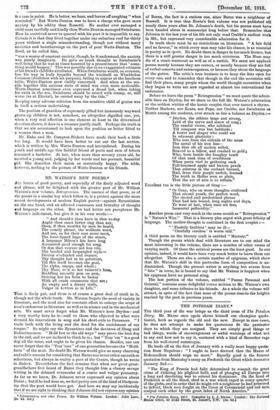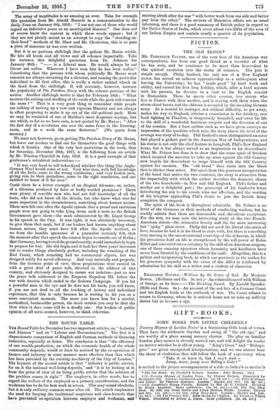THE POTSDAM DIARY.•
TIIE third year of the war brings us the third issue of The Potsdam Diary. Mr. Masse once again shows himself our champion quota- tionist, both as regards the old and the new. Except in rare cases, he does not attempt to make his quotations fit the particular days to which they are assigned. They are simply good things or bad things, words of encouragement or awful warnings of what not to say and how not to say it, scattered with a kind of Berserker rage from his well-stored cornucopia.
He leads off on the first of January with a really most happy quota- tion from Napoleon : " I ought to have decreed that the House of Hohenzollern should reign no more." Equally good is the famous quotation from Macaulay's essay on Frederick the Great which decorates January 2nd :-
" The King of Prussia had fully determined to commit the great crime of violating his plighted faith and of plunging all Europe into a long and desolating war to extend his dominions. On the head of Frederick is all the blood, shed in a war which raged in every quarter of the globe, and in order that he might rob a neighbour he had promised to defend, black men fought on the Coast of Coromandel and red men, scalped each other by the great lakes of North America."
• 2'ho Potsdam Diary, 1917. Compiled by L. J. Mane. London : The National Basins Office, 43 Duke Street, St. James'', S.W. Vs. 6d.1
The array of ineptitudes is as amazing as ever. Take for example this quotation from Mr. Arnold Bennett in a communication to the Daily News on January 6th, 1916: " I am not one of those who would regard an indecisive peace as an unmitigated disaster." One does not of course know the context in which these words appear ; but if they are not plainly meant as an attempt to copy the " standing-on- their-head " methods of Mr. Shaw and Mr. Chesterton, this is as pure a piece of nonsense as was ever written.
But it is no partisan shillelagh that the gallant Mr. Maxso He hits all heads and all views and all schemes impartially. Take for instance this delightful quotation from Dr. Johnson for January 30th: " — is a Liberal man. Ho would always be cut Caesar cut nullus. Wherever I have seen him ho has been nullus." Considering that the persons with whom politically Mr. Masse most consorts are always screaming for a dictator, and naming the particular individual to fill that office, this is really a rather unkind whack on the head from the shillelagh. It will certainly, however, increase the popularity of The Potsdam Diary with the soberer portions of the nation. Another shillelagh motto is that for February 18th : " What matters the cutting and shuffling of the cards while the pack still remains the same Y " That is a very good thing to remember while people are talking of making up a new and vigorous Ministry and are always in effect proposing to make it up out of the old political pack. Hero we may be reminded of one of Halifax's most desperate sayings, but one which, so far as we have seen, is not quoted by Mr. Masse " After the first day of a revolution one aces the same faces in the Drawing- room, and in a week the same flatterers." (We quote from memory.) We must not, however, go on gutting The Potsdam Diary of Mr. Maxse, but leave our readers to find out for themselves the good things with which it bristles. One of the very last quotations in the book, that for Saturday, December 29th, 1917, is the following from an article by Mr. Winston Churchill in July, 1916. It is a good example of that gentleman's calculated indiscretions :— " It was very hard to tell beforehand whether this thing [the Anglo-- German War] would come or not. Very wise men, with full knowledge of all the facts, came to the wrong conclusion ; and very foolish men, giving rein to their prejudices, came to the right conclusion, and are entitled to boast of it for ever."
Could there be a better example of an illogical dilemma, or, rather, of a dilemma produced by false or badly worded premisses ? There were plenty of sensible men who had not full knowledge of all the facts, who did not know all the details, but who knew what was far more important in the circumstances, something about human nature. These men felt sure after the Agadir episode that a proud and ambitious people were not going to take lying down such a snub as the British Government gave them—the snub administered by Mr. Lloyd George in his speech in the City. It was right, it was absolutely necessary, to give them that snub, but if our leaders had known anything about human nature, they must have felt after the Agadir incident, as we from the humble ignorance of a journalist certainly felt, that the moment after that speech the cannon began to rumble out of Berlin ; that Germany, having tested the ground exactly, would immediately begin to prepare for war. She did begin, and it took her three years' incessant toil to render things absolutely perfect, including the remaking of the Kiel Canal, which remaking had no commercial objects, but was designed solely for naval efficiency. And very naturally and properly, from the German point of view, these preparations were carried on with a great deal of peace talk, directed to the address of this country, and obviously designed to ensure our isolation—just as was tho peace talk addressed to the Emperor Napoleon HL before the war with Austria which ended in the Sadowa Campaign. If you hit a powerful man in the eye and he does not hit back, you will know, if you are not deaf to all the teaching of history and individual experience, that this is only because he is waiting to hit you at a more convenient moment. The more you know him for a careful, methodical, businesslike person, the more certain you may be that the blow when it does come will be a deadly one. Our leaders of public opinion of all sorts seemed, however, to think otherwise.



































 Previous page
Previous page